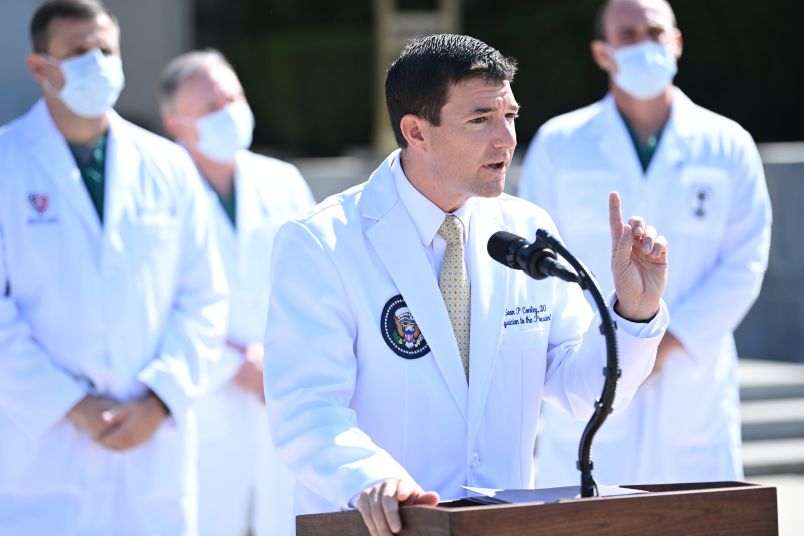President Trump’s medical team said on Sunday morning that he could possibly be discharged from Walter Reed as soon as Monday, but left many questions unanswered even while acknowledging that they painted a rosy picture on the Trump’s COVID-19 condition the day before.
During a briefing outside of Walter Reed on Sunday, Dr. Brian Garibaldi of Johns Hopkins University said that the President could be discharged from the hospital as early as Monday.
“If he continues to look and feel as well as he does today, our hope is that we can plan for a discharge as early as tomorrow to the White House where he can continue his treatment course,” Garibaldi said.
White House physician Dr. Sean Conley said that Trump’s discharge plans will begin if “everything continues to go well.”
Unlike his remarks during an evasive briefing the day before, Conley publicly acknowledged for the first time that the President was given supplemental oxygen on Friday at the White House and had a “high” fever prior to his hospitalization at Walter Reed.
However, Conley appeared evasive when he expressed uncertainty on whether Trump was given supplemental oxygen a second time, after adding that the President’s oxygen level dropped Saturday as well.
“I’d have to check with the nursing staff,” Conley said. “I don’t think that — if he did, it was very, very limited. And the only oxygen that I ordered, or that we provided, was that Friday morning, initially.”
In response light of Trump’s two episodes of drops in his oxygen saturation, Conley said that the President is being treated with dexamethasone, a steroid used as treatment for patients in need of oxygen.
Although doctors said that the President was receiving X-rays and CT scans, Conley declined to go into detail about Trump’s lungs.
When asked whether Trump has pneumonia or any lung damage, Conley offered a vague reply, saying that there were some “expected findings, but nothing of any clinical concern.”
Conley was also pressed on his insistence on Saturday that Trump was doing well, despite White House chief of staff Mark Meadows’ dire assessment that Trump’s vitals were “concerning.”
Conley replied that Meadows was referring to a “very transient limited episode” and that his statement was “misconstrued.”
“What he meant was that 24 hours ago, when he and I were checking on the president, that there was that momentary episode of the high fever and that temporary drop in the saturation, which prompted us to act expediently to move him up here,” Conley said.
When pressed on his initial reluctance to be transparent about the President being provided supplemental oxygen prior to his hospitalization on Friday, Conley claimed that he strived to reflect Trump’s “upbeat attitude.”
“I was trying to reflect the upbeat attitude that the team, the President, over his course of illness, has had,” Conley said. “I didn’t want to give any information that might steer the course of illness in another direction. And in doing so, you know, it came off that we were trying to hide something, which wasn’t necessarily true.”
Sunday’s briefing by Trump’s medical team came shortly after White House national security adviser Robert O’Brien told CBS that after speaking with chief of staff Mark Meadows this morning, he thinks that the President will stay at Walter Reed “for at least another period of time.”
Watch the press conference below:



